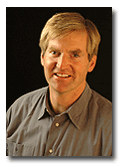 RoHS and WEEE Compliance Underscore Commitment to International Regulations for Environmental Health and Safety
RoHS and WEEE Compliance Underscore Commitment to International Regulations for Environmental Health and Safety
Socket Communications, Inc., an innovative provider of mobile productivity products, today announced certification and compliance with the regulations of the European Union (EU) Restriction of Hazardous Substances (RoHS) Directive. The RoHS Directive, enacted into law by the countries of the EU in February 2003, restricts specific hazardous substances in an effort to address waste management problems linked to materials that are likely to pose risks to human health and the environment.
"Socket takes environmental responsibility seriously and works diligently to make sure all of our products meet global environmental standards," said Peter Phillips (pictured), Vice President of Marketing at Socket Communications. "We have succeeded in meeting the requirements of the RoHS Directive by eliminating the use of banned substances in products sold into the EU. As similar regulations are now being adopted in other geographies around the world, Socket is now offering customers world-wide RoHS compliant products that meet their specific needs. This capability represents a key milestone for Socket in support of our global customer base."
In order to comply with the RoHS Directive deadline of July 1, 2006, Socket put in place a sophisticated management system to ensure that customers could continue to purchase its same high-quality products while working to meet the standards. The law requires all new commercial, electrical and electronic equipment to be manufactured without hazardous materials such as lead, mercury, cadmium, hexavalent chromium, polybrominated biphenyls, and polybrominated diphenyl ethers.
Additionally, Socket has been WEEE (Waste Electrical and Electronic Equipment) compliant since August of 2005 on all products. WEEE is intended to protect the quality of the environment and human health through the prudent use of natural resources and the adoption of waste management strategies that focus on recycling and reuse. Under these laws, producers of most electrical equipment are responsible for their products at the end of their useful lives. Producer responsibility includes meeting labeling requirements, providing information to end-users and treatment facilities, ensuring the availability of collection infrastructure, submitting sales and recovery data, and financing WEEE costs.
Additional information about the Socket RoHS products matrix and certifications is available at: http://www.socketcom.com/rohs.

Add a Comment
No messages on this article yet